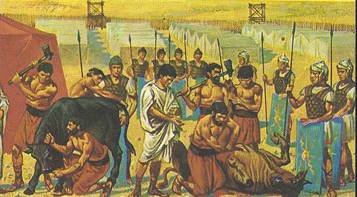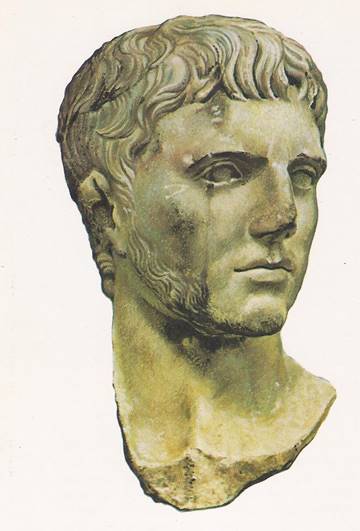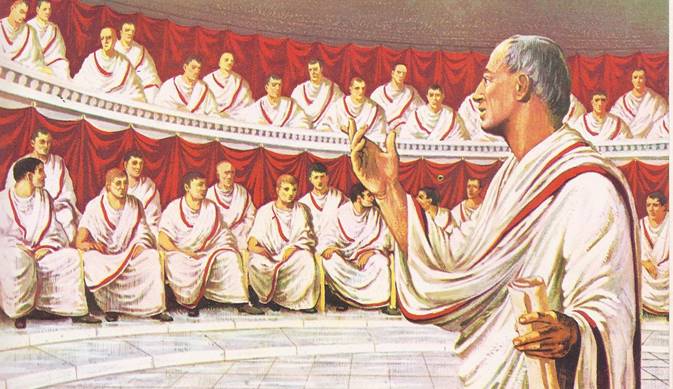Today we speak the words, “I am a World citizen,” with pride. To the people of the ancient world the statement, “I am a Roman citizen,” was a badge of high honour. Beginning as a small city state in Italy, Rome grew into a vigorous republic and finally into an empire so mighty that it included the whole of the Mediterranean world. Even after Rome’s grandeur had waned, its influence lived on among later peoples. Rome’s history is a reminder that the destiny of a nation rests more on the wisdom of its leaders and the character of its people than it does on military might and economic strength. Consider for a moment the two following scenes from Roman history. (1) The year is 216 B.C. It is a sad day in Rome. Word has just been brought of a great disaster. A Carthaginian general named Hannibal has invaded Italy and has just wiped out the Roman army that faced him. Rome’s allies are wavering in their loyalty. Some have already gone over to the enemy. An immediate attack on Rome is expected. Yet, the Senate (Rome’s council of state) refuses to give up hope and calls upon the citizens for fresh troops and supplies. It puts the city in a state of siege, or on the alert for final defense against destruction. It refuses to pay a ransom for Romans taken prisoners by the Carthaginians. When the Roman general who lost the battle returns with a handful of soldiers, he is not criticized. Instead, the Senate praises him for not giving up hope of saving the state. The confidence of the Senate was justified. Fifteen years later, it was Carthage and not Home that was conquered. In this crisis you see the Romans showing qualities which made them great: courage …
Read More »After the Peace of Paris 1919 – 1920
DURING THE war, three great empires — the Russian, the Austro-Hungarian and the German –had vanished forever. Then, by the Treaty of Sévres, a fourth empire, the Ottoman, was quietly put to death. Turkey was confined to Asia Minor and became a republic. Of its former possessions, the League of Nations assigned Syria and Lebanon to France and Palestine and Iraq to Great Britain. Trans-Jordan and Saudi Arabia, which had fought the Turks under an adventurous British colonel named T. E. Lawrence, became independent kingdoms. In Europe, there were seven new states: Finland, Estonia, Latvia, Lithuania, Poland, Czechoslovakia and Yugoslavia. The first six, with Rumania, formed a zone that blocked Russian communism from spreading westward. Rumania had grown larger at the expense of Hungary, Russia and Greece at the expense of Turkey. Hungary and Austria were made small independent states, with no link between their governments. The South Slavs, who had triggered the crisis that brought on the war, saw their dream come true in a free, united Yugoslavia, but some Yugoslavs were still dissatisfied, for the Allies, in line with their secret treaty of 1915, had given Italy the port of Trieste and some islands on the Dalmatian coast of the Adriatic. Italy also received the Trentino and South Tyrol, former Austro-Hungarian lands. AMERICA AND THE LEAGUE Although the five treaties of the Peace of Paris changed the map of the world, it left more than one nation resentful and discontented. The Italians felt that the Allies had betrayed them by not giving them any of the German colonies. The Japanese felt cheated of their rightful gains in the Pacific and the Germans were particularly bitter, for they felt they had been unjustly treated in almost every way. When the peace conference began, they had expected that the Allies …
Read More »The Victors Reconstruct Europe 1918 – 1919
IN THE closing weeks of the war, the Austro-Hungarian Empire came apart. Its subject peoples proclaimed their independence, through “national councils” set up in Paris and London. On November 12, 1918, the last of the Hapsburg emperors, Charles I, abdicated and the next day Austria became a republic. Hungary became a republic a week later. Yugoslavia and Czechoslovakia also came into existence and Rumania helped itself to the slice of Hapsburg territory called Transylvania. Before any peace conference could meet, the empire’s former subjects had redrawn the map to suit themselves and the Allies formally recognized the new nations. THE KAISER ABDICATES Unlike its ally, the German Empire held firm almost to the end. Earlier in the war, the liberals, democrats and socialists in the Reichstag, Germany’s legislative body, had put off their demands for the sake of national unity. Power had become concentrated in the hands of the generals, led by General Ludendorff. On September 29, 1918, Ludendorff told the Kaiser that Germany must sue for peace. Furthermore, he urged the immediate formation of a new government along democratic lines, based on the important parties in the Reichstag. The kaiser was astonished, but he soon realized that the army must be in a desperate situation for Ludendorff to suggest such a step. He knew, too, that the proud military aristocrats who commanded the army could not bring themselves to surrender; the task must be left to civilians. Sadly the kaiser gave his consent and Prince Max of Baden, a liberal nobleman, agreed to head a cabinet that included the socialists. By October it had put through a number of reforms, but the socialists were not satisfied. They threatened to quit the government unless the kaiser abdicated. Meanwhile, as word spread of the disastrous military situation, the German people began …
Read More »Florence, First City of the Renaissance 1200-1480
March 25, 1436, was the Feast of the Annunciation and the city of Florence was decked out for a celebration. Banners flew everywhere, ribbons and garlands of flowers decorated the houses and draperies of cloth-of-gold were looped across the shop-fronts. The city bustled with excitement, for on this Annunciation Day the pope was to dedicate the Duomo, the wonderful new Cathedral of Santa Maria del Fiore, then the largest church in the world. At dawn, the people began to fill the streets. They crowded around the high wooden walk that led to the cathedral from the monastery where the pope was staying. At mid-morning, when a blare of trumpets signaled the start of the ceremonies, a great procession filed along the walk. The pope, robed in white and crowned with a tiara, was attended by seven cardinals, clothed in scarlet and 37 bishops and archbishops, all in purple. There were the priors, the governors of Florence and the representatives of the people of sixteen districts of the city. Each representative carried a standard marked with the emblem of his district, such as the lion, the unicorn, or the viper. Marching in a solemn line came the leaders of the seven great guilds — the wool merchants, the Silk weavers, the bankers, the notaries, the druggists (who also dealt in spices and jewels), the furriers and the calimala, the ancient and honoured guild of cloth merchants. Behind them came the officers of fourteen “Guilds of Lesser Arts” shoemakers, bakers, innkeepers, grocers, carpenters and the like. As the procession entered the cathedral, all the church bells in Florence rang out. Their deep voices called across the city, resounded in the fields beyond and echoed in the hills of Tuscany. Triumphantly they proclaimed the greatness of the new Duomo that the Florentines said …
Read More »The City of Augustus 29 B. C. – A. D. 14
IN 29 B.C. the gates of war were closed. Rome was at peace. Senators and the people of the mob-men who had hated and fought each other through long, bitter years — stood side by side in the Forum while the great doors of the temple of Janus were slowly pushed shut. That had happened only twice before in the history of the city. The crowd in the Forum cheered the peace and they cheered Octavius, their new ruler. He was no longer the young man who had rushed to Rome after the murder of his uncle, Caesar. Seventeen years had passed since then — seventeen years of hard campaigning, of friends who became enemies and of alliances that were broken. He was still handsome and his sharp eyes could still look through a man. He walked with a new dignity that won him the respect of the people and Senate alike. Wherever he went, cheering crowds followed him. His friends told him that he could make himself the king of Rome. Octavius remembered what had happened when Caesar had thought of becoming a king. Caesar had proved that one man with an army could do what the bickering Senate and the mob could not do: he could run the empire. A world with millions of people in it was still like the smallest Roman family; it worked best with only one pater familiar. Octavius meant to be that all powerful father of Rome, but he intended to let the Romans think that they had asked him to be it. He celebrated his Triumph with processions that went on for three days. With the treasures he had won in Egypt, he bought land to give to his soldiers. He ordered the building of a splendid temple to Apollo, as he …
Read More »The Second Triumvirate 43 B. C. – 30 B. C.
AS THE news of Caesar’s death spread through Rome, sorrow, anger and fear took hold of the city. On March 17, two days after the murder, the Senate met again. Cassius, Brutus and the other assassins took their usual places. There was no doubt that most of their fellow senators felt that they had done the right thing in ridding Rome of a tyrant, but Caesar’ s veterans were still in the city, taking their orders now from Marcus Aemilius Lepidus, who had been his Master of the Horse, the commander of the cavalry. Mark Antony was still consul, he had not yet said what he intended to do about Caesar’s murder, but certainly he would not forgive the killers.Of course, no one could tell what the mob might do. If the people took it into their heads to avenge the murder of their hero, there might be many more killings. So it was a cautious, quiet group of men who gathered in the Senate to discuss the death of Caesar and the future of Rome. When Mark Antony spoke, he surprised them by not demanding that the assassins be arrested and put on trial. Perhaps he was afraid that they had strong forces of their own or that he might be the next victim. Whatever his reasons were, he offered to make a bargain. He would agree to let the assassins go unpunished, if the Senate would agree to approve Caesar’s will and allow his friends to give him a proper, public funeral. To the senators, the terms sounded fair — better, in fact, than they had hoped for. They quickly agreed to their part of the bargain, ended the meeting and went home, congratulating themselves that it all had been so easy. THE FUNERAL OF CAESAR On the …
Read More »The City Divided 130 B. C. – 70 B. C.
MARCUS TULLIUS CICERO, a young statesman known for his dramatic speeches, stood before a panel of judges in a courtroom in Rome. He stared at them angrily. For fifty days he had travelled through Sicily, collecting facts about the crimes committed by Caius Verres, the man who was on trial. Now the judges had told him that there would not be time to listen to his evidence. Cicero knew that the judges had been bribed. For it was no ordinary criminal that he meant to send to prison or to death. Caius Verres was an aristocrat and a senator and had served for three years as the governor of the province of Sicily. Verres’ lawyer was Hortensius, the leader of the aristocrats. Indeed, every rich or important man in Rome seemed to be supporting Verres, but Cicero was determined that this man should not escape judgment. He turned to Hortensius and offered to present his case in one day. “Would the court have time enough for that?” ‘ he asked sarcastically. Hortensius was surprised, but he smiled and told Cicero to try it if he liked. The judges agreed. For a moment there was silence in the courtroom, as Cicero turned to face the benches where the long lines of judges sat. Sternly he looked from man to man until he was certain all their eyes were on him. Then he began to speak. He listed Verres’ crimes: When he was governor and the commander of Rome’s army in Sicily, he had taken for himself the money raised to pay the troops. When he was governor and responsible for order and justice in the province, he had taken more money to allow pirates to rob the ports, to set criminals free and to condemn innocent men. For gold, he had …
Read More »City of Romulus B. C. 900 – 256
In the time when savage warriors roamed the plains and mountains of Italy, there stood on six low hills, just south of the river Tiber, six clusters of round huts made of twigs and leaves stuck together with mud. Each was a little town, the home of barbarian tribesmen. They herded cattle on the plain below, chased the wild pigs in the woods and tried to make things grow in their marshy fields. Although the towns were always fighting or stealing cattle and sheep from each other, they shared a market place in a clearing beside the river. They also shared a crude fortress of heaped-up earth and rocks on a seventh hill. The huts on the hills, the market place, the fortress – this, about B. C. 900, a hundred years or so before the Etruscans came to Italy, was Rome. Then a powerful chief came to the place of the seven hills. When he had built a great hut of his own, on the widest of them, he called together the chiefs of the six towns. He told them that he planned to build a city on their hills and that their towns would all be parts of it. Whether the old chiefs agreed to the plan or not, it was done. On the day in April which was the feast day of Pales, the guardian god of herds and flocks, the new chief performed the solemn ritual of the founding of his city. With a bronze plow, drawn by a caw and a bull yoked together, he dug one furrow – a sacred line that marked the city’s boundaries, the place where its walls would be built. He traced the lines of two main streets – one running north and south, one east-and-west and crossing in the …
Read More »The Greek Way of Life 700 B. C. – 343 B. C.
In the first years of Spartan peace, Greece was filled with wandering soldiers. Their little cities needed them no more. The new governments, which Spartans appointed, looked on them as men who might make trouble and were quick to get rid of them. Homeless and with no way to earn a living, the old campaigners roamed from place to place. They became soldiers of fortune, men who fought for any general or city that offered pay and three meals a day. In 401 B. C., ten thousand of them hired themselves out to Cyrus, a prince of Persia, who hoped to steal his brother’s throne. The Army of Ten Thousand was an odd lot. There were officers and men from a dozen or more Greek states, soldiers who had fought with and against each other during the thirty years of war that had torn Greece apart. Yet, under a foreign commander, they worked well together. They made a strong force which no Asian army could begin to match. Cyrus led them far into Persia and wherever they went they were victorious. Then Cyrus was killed in battle and the Greek officers were tricked and treacherously murdered. The great army suddenly found itself stranded, with neither money nor leaders. The men were not even sure where they were, except that it was hundreds of miles from the coast of Greece. Election of Xenophon The Persian king waited for them to lose heart and surrender, as any Asian army did when it had no officers to give it orders. The Army of Ten Thousand was Greek. After a day of confusion, the soldiers called an Assembly and elected a new general, Xenophon, a young Athenian who had been the assistant of one of the dead officers. For four months he led them …
Read More »








